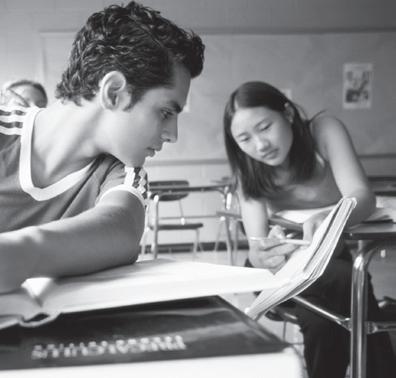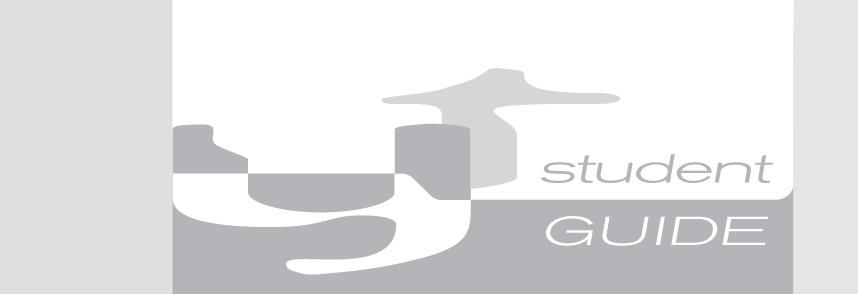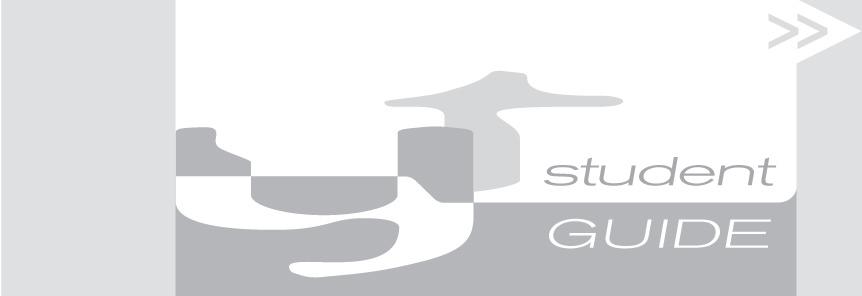Young Teen TEACHER GUIDE



Unless otherwise indicated, all Scripture quotations are taken from the Holy Bible, New Living Translation, copyright © 1996, 2004, 2015 by Tyndale House Foundation. Used by permission of Tyndale House Publishers, Inc., Carol Stream, Illinois 60188. All rights reserved.
Scripture quotations marked (KJV) are taken from the King James Version of the Bible.
YOUNG TEEN TEACHER GUIDE (ISSN 10809732) is published quarterly by Gospel Publishing House, 1445 N. Boonville Ave., Springfield, MO 65802-1894.
POSTMASTER: Send address changes to Young Teen Teacher Guide, 1445 N. Boonville Ave., Springfield, MO 658021894.
For information about quality discipleship resources for all ages, visit www.GospelPublishing.com or www.MyHealthyChurch.com or call tollfree 1-800-641-4310.

1151 © 2024 by Gospel Publishing House 1445 N. Boonville Ave. Springfield, Missouri 65802
in U.S.A. Volume 70 Number 1 Sep • Oct • Nov 2024

Focus: As people become more connected to a digital world, the unintended consequence is that they are becoming more disconnected spiritually in many ways. The more time we spend being fascinated with new technologies, the less time we have to give love and attention to those who are physically near to us. Discover some of the benefits and challenges of participating in and exploring the world of electronic connectedness.
September 1: .com Technology Talk
Deuteronomy 8:1–18
September 8: Network Connections
Mark 16:15,16; Luke 10:25–37; Acts 1:8; Ephesians 6:1–4; Hebrews 10:22–25
September 15: Internet Integrity
Deuteronomy 27:9–26
September 22: .edu Belief in God
Deuteronomy 7:1–26

Focus: To study the faith of a Jewish woman whose story is found near the middle of our Old Testament. Like Esther, taking a strong stand for God’s people is important, even in the face of opposition and perceived adversity. God has a plan, and He will guide you in troublesome circumstances; we need to have faith in His ability to lead us through.
September 29: Time to Take a Stand
Esther 3:1–15; 2 Timothy 3:12
October 6: Time to Depend on God
Esther 4:1 to 5:8
October 13: Time to See Results
Esther 5:9–14; 7:1–10; 1 Peter 1:24,25
October 20: Time to Spread the Word
Esther 8:1–11,14–17; 9:20–22,28; Hebrews 9:15
Focus: Students will learn about what it means to be missional, whether that means supporting international missionaries, considering later work in a different country, or working in their own community. Jesus came to earth to seek after lost people and to save them. How can we be sure that everyone has the opportunity to receive the gospel? Help students find their calling as they, and you, follow Jesus’ Great Commission.
October 27: The Cause
Luke 15:1–24; 19:10
November 3: The Commission
Psalm 71:17,18; Matthew 4:18–22; 28:16–20; Acts 1:8; Romans 10:9–15
November 10: The Cultures
Acts 16:1–5,11–15; 17:16–34; 1 Corinthians 9:20 –22
November 17: The Call
Acts 4:32–37; 9:1–19; 11:11–18,22–30; 13:1–3; 15:22,25–39; 16:1–10; Romans 1:1; Galatians 2:1,2; Colossians 4:10; 1 Timothy 4:11–16; 2 Timothy 4:11
November 24: The Commitment
Matthew 28:19,20; Acts 20:1–6; 21:5,6; 28:15; Philippians 4:10–19; Colossians 4:3

You’ve made the right choice in choosing this curriculum. It provides solid biblical teaching at a level your students will enjoy and understand. The lessons are designed for easy preparation, and the activities will keep your teens interested and reinforce the lessons. As you begin your preparation, use the following checklist to keep track of all the curriculum pieces you will be using.
❏ Young Teen Teacher Guide— 13 easy-to-use lessons, plus helpful hints and tips
❏ Young Teen RESOURCE— lesson helps for classroom use
❏ Young Teen Student Guide— full-color take-home papers with stories and relevant information
❏ Take Five Plus— daily devotional with a thru-the-Bible format that encourages personal devotions
Now, consider what you already know about your class.
Time—How much class time do you have? Be sure to consider total time as well as actual teaching time (after greeting, transitions, etc.). Estimating the time it will take for each activity will help you decide which ones to use.
Setting—What is your classroom setting like? Is it arranged in lecture style? Do you have a table? Don’t be afraid to get creative in your arrangement. Experiment by bringing in informal furniture for a more relaxed atmosphere.
Teachers—How many teachers and helpers do you have? You might have them facilitate small group discussions or set up for another activity.
Students—Who are your regular attendees? How do they learn best? Do you frequently have visitors? It’s a good idea to plan your lesson for the regular attendees, but be prepared in case of visitors.
Next, consider what you know about your regular attendees. You may want to keep notes (sample, right) on each student describing how he or she learns best.

Nate, 13
Learns by hearing—He’s always talking at the wrong time, is often the first to answer a question, and loves to listen to stories.
Michaela, 14
Learns by seeing & touching—She always looks “put together,” matching from head to toe, and notices how others look. She enjoys watching videos and looking at pictures.
Amber, 12
Learns by moving—She’s very athletic and is always on the go, so she prefers games and activities that involve movement.
Zack, 14
Learns by moving, talking, and touching— It’s difficult for him to remain focused on the task at hand. He was diagnosed with ADHD.
If your regular students cover all the learning styles (like the sample note at right), you won’t have to plan other activities for less frequent attendees. If your class has primarily one or two learning styles,* you may want to have variations or additional activities ready for visitors. If you do not have consistent, regular attendees, plan a variety of activities to cover all learning styles.
*To learn more about learning styles, see page 5.

The “Teacher Focus” helps you become familiar with the lesson and how it relates to your students. Use the Activities list to make sure you have all your supplies ready.
An opening activity will help your students become comfortable and begin to open up and interact. This will help facilitate further conversation in class.
Discussion questions, like the ones provided in this lesson, will appeal to your students who, like Nate, learn by hearing. Teens like to talk and interact with one another. Discussion creates a sense of community, and will help them discover and develop their own ideas and better retain the lesson.
The sidebar offers additional background information and tips that will help you prepare and give you easy access to the information while you teach.
Using narratives like the ones in the student guide illustrates the lesson and helps students recognize how the objectives translate into everyday life.
Drama will involve students like Zack and Amber who learn by moving and touching. It also reinforces the lesson for your other students as they get to “experience” the illustrations.
At this point, sit down with your Young Teen Teacher Guide and adapt the lesson to fit the needs of your class. Highlight, circle, or mark the activities that your students will enjoy and, most importantly, that meet their learning styles. Here is an overview of the lesson and a sample way to teach it.

Resource Item:
Activities that include “listing” and “writing,” like this one from the YT RESOURCE, benefit teens like Michaela who learn by seeing and touching.
Allowing time for personal reflection will help your students learn to apply the lesson to their own lives. Involve Them:
It’s important to always leave the students with a spiritual action and give them something to consider and strive for throughout the week. This is also a good time to present the opportunity for salvation if you are unsure of where some of your students are spiritually.
As you teach the lesson, constantly evaluate:
• Your students— What are you discovering about them and how they learn?
• Your lesson— Are the students grasping the concepts and objectives presented in the lesson?
• The options— Are they working well with your teens? Is the order flowing like you’d hoped?
• The time— Do you have enough (or too much) material planned for the allotted time?
After each class, evaluate the lesson as a whole using the questions from step four.
* The lesson went well.
* We ran out of time, but had great discussion.
* They loved the charades. Note: Drama is a hit!
There’s no specific formula for a successful Sunday School class, and there’s no guarantee all your teens will remember what you teach them and apply it to their lives. But God promises His Word will not return void. By following these five simple steps, you can teach biblical principles so many of your students remember and apply them. T hat’s what teaching is all about.

Miguel likes to “see” his world. He enjoys colors, contrast, posters, illustrations, and videos, but gets bored when there are no visuals.
HOW TO TEACH MIGUEL:
• Display posters from the YT RESOURCE
• Distribute YT Student Guides and incorporate them into the study.
• Use visual illustration options.

Allison “hears” her world. She responds well to verbal interaction and enjoys being involved in discussion and debate. She becomes bored when she hears information she already knows.
HOW TO TEACH ALLISON:
• Discuss Bible and life-application stories.
• Ask discussion questions from the study.

(tactual)
Michaela likes to get in touch with her world. She learns best through hands-on activities. She needs to compare information and make decisions based on experience.
HOW TO TEACH MICHAELA:
• Do activities from the YT RESOURCE
• Use hands-on illustrations and activity options.
• Role-play case studies to explore feelings and opinions.

HOW TO TEACH ZACK:
Zack loves to experience his world. He moves a lot during class and enjoys participating in active illustrations like dramas and hands-on activities.
• Act out the Bible story or case studies from the YT RESOURCE
• Create opportunities for small-group interaction.
• Allow for freedom of movement.





Teens today have grown up in a world of swift and constant changes. Technological changes. Geographical changes. Political and economic changes. Nothing is static. Few things are stable. Most things are shifting— jobs, relationships, lifestyles. Values are constantly redefined, and everything is open to personal interpretation—including “truth.”
In the past, people regarded truth as something to be sought and discovered. But in this postmodern age, truth is created out of convenience— defined by one’s own experience, if at all. Often whatever a person thinks is true is considered true. What one perceives to have happened in a particular situation is just as valid as what actually happened. Personal experience has become the measure of what’s “right.” It’s no wonder the concept of absolute truth is so elusive to this generation of students.
An intense challenge faces Christian teachers who are trying to convey timeless truth concerning the God who never changes, a message
that never changes, and a Savior who claims to be the only “way, the truth, and the life” (John 14:6, KJV).
While only the Holy Spirit can illuminate truth, lessons that consistently accomplish certain goals can help students deal with the concept of scriptural absolutes. While the following approach is more subtle than an argument using apologetics, in time it will be more effective in settling issues of truth in students’ minds and hearts.
In this age of spiritual “openness” and religious pluralism, misconceptions about God are common—even in the Church. Your teaching should always highlight or reveal something about the nature of God because His commands are rooted in His character. We always want students
to better understand why right is right and wrong is wrong, so our teaching must do more than explain what God says, does, or expects. For a generation that seeks and values personal relationships above most things, focusing on the identity of Jesus provides a personal connection that theological rationale cannot. The emphasis must be on knowing God and His “personality.”
Passages that demonstrate God’s perfection, holiness, and justice help us understand His view of sin and call to righteousness. Seeing how God miraculously heals and provides leads to greater dependence on His promises and encourages students to take Him at His Word. They learn to trust, even when they don’t understand their circumstances.
Citing examples of God’s patience helps students view His dealings with people through the eyes of grace. They begin to understand that truth does not change because God does not change. His character and unfailing compassion are the
proven bases of right and wrong. As students gain a greater appreciation for the person of God—who He is—they will better understand the
For a generation that seeks and values personal relationships above most things, focusing on the identity of Jesus provides a personal connection that theological rationale cannot. The emphasis must be on knowing God and His “personality.”
principles of God—why He acts as He does.
Examine the
of God—the “Whys” behind His Words—as the Reasoning for Truth.
While many students possess strong “convictions,” very few have an adequate understanding of why they believe what they believe. Lessons should pose many questions that challenge students to discover for themselves the purposes behind God’s precepts. Rather than telling students what to do—or even focusing on what they are doing—explore “why.” By delving deeper into the context of scriptural narratives, students will not only see what God did, but also determine why He did it.
For example, even passages from Leviticus, which may seem like a litany of rules and regulations unrelated to contemporary life, reveal something very significant about God’s character and His reasons for establishing certain guidelines.
Part of the reasoning was to foreshadow the work of Christ. Beyond that, why did God require such staunch adherence to rituals about housecleaning and hygiene? Was it just a matter of getting His people to prove their devotion by toeing a line of legalism? Consider how the people lived—in a close-knit community that lacked the technological advancements of modern society. A contagious illness or infectious skin disease would have run rampant, wiping out large segments of the population.
God was demonstrating His ultimate care and provision by expecting His people to stick to the disciplines He had established. When students realize that all God says and does is for our good, they begin to view His commands as protective blessings rather than restrictive regulations— even when they seem to defy human reason.
For many in this generation, truth must be “validated” by experience—not simply because the truth demands validation, but because this generation requires it. If they live it, they believe it. Therefore, classes must provide ample time to consider the practical application of biblical truth as it relates directly to the needs and circumstances of everyday life. Lessons should challenge and equip students to do something with what they learn, and lead them into situations that give them a reallife “taste” of the truth.
You will further solidify the truth in students’ hearts and minds as you involve them in ministry that serves
others, particularly those in need. Teens observe so many prominent people, claiming to “care” and having the means to act, who give little more than lip service to a cause. Your students assign far more credibility to the words and beliefs of those who put action with their compassion.
Classes must provide ample time to consider the practical application of biblical truth as it relates directly to the needs and circumstances of everyday life. Lessons should challenge and equip students to do something with what they learn, and lead them into situations that give them a real-life “taste” of the truth.
When students understand that God’s eternal precepts are based on unfailing principles rooted in His unchanging personality, they are more readily convinced that His truth is the only truth—and that truth never changes.


H E L P !!
I can’t get my kids to talk (at the right time, that is).
One of the greatest skills any teacher can develop is the ability to lead discussions. A good discussion leader—one who knows how to get student responses —can teach more effectively than someone who knows only how to incorporate and direct a lot of activity, which is important as well. Many teachers are convinced, however, that they can’t get their classes to speak up (at the right times, that is). But when they make the time to listen, most teens are more than willing to offer their views. It’s not just what you ask, but how you ask that matters. Asking the “right” questions isn’t enough; you must ask the questions right . That’s usually the difference between a lively conversation and no conversation at all. Here are some general guidelines for crafting effective questions and facilitating great discussion:
Your questions, not just your answers, will make your discussion a dynamic one.
• Avoid “yes or no” questions. Stay away from questions beginning with “Is there…?” “Are they…?” or “Do you think…?” Unless you follow up on such questions, the discussion usually ends right there. Ask more “why” questions, encouraging deeper exploration, opinions, and discussion. Keep questions simple and open-ended enough to provoke thought, yet specific enough to apply to real-life situations (e.g., “How?”; “Why?”; “What would you do?”; “When have you felt…?”).
• Don’t ask questions that assume an answer. For example, “Why was Jesus upset about…?” implies He was upset and there is an exact answer as to why. This kind of question tells students too much without leaving them room to
discover implications and insights for themselves. Your goal is to help students explore and discover answers rather than to give them yours.
• Don’t ask for a response without following up. “How many of you ever...?” and other show-of-hands type questions are no more effective than “yes or no” questions, unless you follow with “why” or “how” inquiries. Then, the initial “yes or no” response can help draw students into the issues you are presenting.
• Write questions that are relevant to your students. As you craft your questions ahead of time, think about where your students are—their maturity, spiritual levels, trials, etc. People are more likely to answer questions that clearly relate to issues in their own lives. What they learn from such discussions will be more spiritually valuable than generic interactions.
• Ask questions that deal with feelings as well as facts. Your goal is to engage your students’ hearts as well as their minds. The longer your group is together, the deeper, more personal your interaction can become.
Let your conversation be gracious and attractive so that you will have the right response for everyone.
—Colossians 4:6
• Do your homework While slick answers aren’t solutions, neither are uninformed guesses. Your students know when you don’t know. Prepare for each session by investigating your texts’ literary and historical data (e.g., genre, occasion, setting, time period). And if you get caught off guard by a difficult question, admit you don’t know the answer, research the issue, and report your findings to the class next week.
• Understand what motivates your students’ questions. Teens often find Bible passages unintelligible, disagreeable, and/or convicting. Because different motivating factors require different answers, find out what your students really want to know. You can enhance the effectiveness of your responses by answering the “question behind the question.”
• Start where the student is and work forward. Don’t rehearse theologians’ nifty solutions or require allegiance to absolute principles. One-size-fits-all responses communicate disrespect to your students. Taking their inquiries seriously is one of the most effective ways of building rapport with them. Start your answer at the beginning (i.e., where the student is) and move toward the end (i.e., where your solution is).
• Speak your students’ language. Be sensitive to your students’ spiritual maturity and vocabulary levels. Don’t be afraid to address complex concepts and use technical words, but explain what they mean. Listen to the ways questions are being asked and frame your responses in similar terms. While teens don’t want you to adopt their slang and verbal habits, they do want you to speak in a language they can understand.
• Celebrate the mysterious aspects of faith. Many of your students probably reject the idea that anything or anyone— including God—can be understood with absolute certainty. Use the mysterious and even paradoxical ideas of Christianity to excite students about the Bible’s content and its message.
Growinthegraceandknowledge ofourLordandSaviorJesusChrist. Allglorytohim,bothnowand forever! Amen. —2 Peter 3:18
Leading a Teen to Christ
Evangelism is a privilege. There’s nothing quite so exciting as helping a young teen accept Jesus as Savior. As you teach, look for opportunities to lead teens to Christ and allow time for them to respond to the salvation invitation. Use this plan to guide them as they accept Jesus as Savior.
• Read Romans 3:23 (NLT shown here):
“For everyone has sinned; we all fall short of God’s glorious standard.”
• Say, “Everyone disobeys God. Sin involves breaking God’s law.”
• Ask, “Do you realize that you also have sinned?”
• Read John 3:16 (NLT shown here):
“For this is how God loved the world: He gave his one and only Son, so that everyone who believes in him will not perish but have eternal life.”
• Say, “God hates sin but loves each of us—even though we all sin. He loves us so much that He gave Jesus, His Son, to die and take the punishment for our sins.”
• Lead the teen in the sinner’s prayer:
“Dear Jesus, I am a sinner. I have disobeyed You. Please forgive me. Come into my heart and life. Help me love and follow You. Thank You for the gift of salvation. Amen.”
• Read Romans 10:9 (NLT shown here):
“If you openly declare that Jesus is Lord and believe in your heart that God raised him from the dead, you will be saved.”
• Say, “Asking Jesus into your heart is the start of a new life—a life where Jesus is your Leader, your Lord. He will never leave you alone.”
• Ask, “Do you have any questions about what has just happened?” Be prepared to respond.
• Encourage the teen to tell someone about his or her new life with Jesus.
• Tell the teen’s guardians/parents the good news of his or her salvation.
Ask if the teen would like to be baptized in water as a sign of his or her decision to live for Jesus.

Isn’t it ironic how advances in technology designed to improve communication often have a nasty habit of isolating people? The very devices intended to bring us together can keep us apart. Teens spend hours on the internet or using social-media apps while ignoring family members in the next room. Adults trade face-to-face interactions with their parents and friends for more time exploring the newest fascination online. Couples struggle to form relationships as one person stares at a computer screen while the other watches TV in another room. It seems like the more “connected” our world becomes, the more difficult it is to stay connected to each other.
The problem might seem ironic, and the answer also seems to take us in an unexpected direction. Rather than searching for a futuristic solution to our contemporary situation, we should look to the past. The ancient words of the Bible can show us how to navigate the ins and outs, the ups and downs of the modern digital age. It holds vast stores of wisdom for handling new opportunities.
This unit is designed to help you tackle the relevant topics of technology, connecting, integrity, and faith. Your students will gain insight into how digital devices affect their daily lives, how they can build strong relationships, how to maintain moral purity when using technology, and how to exercise discernment when encountering spirituality online. These studies can help your students make good connections with God in the midst of a restless world—a world that has become physically and often spiritually disconnected.
1
1
Tech Tools: Assign groups of students to research and bring back to class reports on the following topics:
• Use of technology by missionaries.
• Technology available to enhance Bible study.
• Use of technology in churches.
• Resources available from church websites.
Students can interview Christian leaders and college students or search national Christian websites.

2
2
Network: After securing permission from church leaders and pastors, start an e-group or internet connect group to facilitate student discussion and interaction with people from other church ministries. (This is a network of people who communicate with each other using video conferencing or email, usually discussing a particular topic. One person can act as a moderator, leading the discussion and making sure the input is appropriate.) Your students could use this e-group (or internet connect group) to talk with other Sunday School classes or with other groups in your congregation. This is a good way to allow teens to interact with those outside their peer groups. Possible discussions could include a lesson topic from Live Youth found at BibleEngagementProject.com.
3
3
1 2 3
Playtime?: Have your students write and produce a play that illustrates how people can use technology in a positive manner and how some people misuse technology. Make sure the play clearly shows what harm can come from using technology in the wrong way. With your pastor’s approval, arrange for the students to present the play at a local festival or church event that targets the entire community. If that’s not possible, you might also consider presenting the play at a local park or some other venue where it would not be necessary to charge an admission fee.
Deuteronomy 8:1–18
Deuteronomy 8:3
People do not live by bread alone; rather, we live by every word that comes from the mouth of the LORD (NLT).
Man doth not live by bread only, but by every word that proceedeth out of the mouth of the LORD doth man live (KJV).
Tech Specs
• Paper, pens/pencils
• Craft supplies (optional)
Robot Relay
• Marker board, markers
Digital Divide
• Young Teen RESOURCE item “Digital Divide”
• Pens/pencils
Technology Warriors
• “Safe Here (Acoustic Version)” by Tasha Layton from the album Into the Sea


Adolescents have always exerted considerable energy finding and forming their identities. They adopt attitudes and actions that reinforce who they think they want to be, while rejecting those that don’t. However, unlike previous generations, today’s teens must contend with an ever increasing field of input. Though teens may use the internet and use social apps to stay current on the latest trends, they’re interested in more than sheer novelty. Teens use technology as a tool to help shape their opinions (e.g., online research), to develop relationships (e.g., texting), and to make personal choices (e.g., downloading or streaming music).
This class session will help you equip your students to make wise choices as they face a world of expanding digital options. As you prepare your presentation, consider your own thoughts on, feelings about, and interaction with technology. If you’re not experienced with computers, smartphones, and internet technology, ask students to help you better understand how they operate. While you may feel a bit selfconscious about your lack of knowledge in this arena, your willingness to learn from students will actually strengthen your personal connection with them. If you’re an online guru, allow the principles of this study to inform and challenge your own technological choices.
YOUNG TEEN
God’s instructions for facing new opportunities can help us use technology wisely.
Our world is filled with new technology—some of which can affect our relationship with God.
Praise, consider, and obey God when using technology.
Ask your students the following questions to get them thinking about the place of technology in their lives.
? How many of you search the internet at least once a day?
? How many of your friends text or use social media every day?
? What are some good reasons young people use the internet?
• Finding information
• Listening/watching music, videos, podcasts
• Participating in discussion groups
• Social networking or blogging/vlogging
• Playing video games (or through interactive gaming systems)
• Keeping and maintaining existing relationships
? What is your favorite technology? (Answers will vary. Help students recognize the larger and smaller ways technology influences them. Some examples: smartphones, microwaves, calculators, video gaming systems, personal computers/laptops/tablets, digital music/wireless earbuds, transportation, food storage and prep, special effects in movies, streaming/live streaming/video conferencing, sports training with VR and AR, robotics/drones, artificial intelligence, personal digital assistants)
? What does the Bible have to say about technology?
• The Bible mentions some technology new to its time period (masonry, shipbuilding, metallurgy).
• Of course, it doesn’t mention much of today’s technology (smartphones, computers, space travel, the internet).
• The Bible does provide principles for making good decisions when using new forms of technology.
Explain that today’s study will consider
•• how God gave instructions to the Israelites to prepare them for entering the Promised Land, a land of people who did not serve the one true God,
•• how God’s instructions to the Israelites can help us make wise decisions about our use of technology, and
•• how we can use these instructions in our everyday lives.
Deuteronomy: A great place to find principles for making good decisions about technology is the Book of Deuteronomy. It contains God’s instructions to the Israelite clans before they crossed the Jordan River and entered the Promised Land (Deuteronomy 4:1,2).
About forty years before this point in their history, God freed the Israelites from slavery in Egypt. At this juncture, He was moving them from the Sinai wilderness to Canaan, a land on the Mediterranean with many resources (e.g., water, food, materials).
Read or have a volunteer read and summarize the following passage.
•• Deuteronomy 8:1–9 God tells the Israelites to follow His instructions, remember how He disciplined and provided for them, and prepare to enter a new land.
Divide your students into four groups, and have each group discuss one of the following questions:
? Why did God give the Israelites instructions? (Following God’s instructions would allow the Israelites to survive, increase in number, and inherit the Promised Land.)
? How and why did God test the Israelites? (He tested them to determine whether or not they would depend on Him and follow His counsel.)
? Why does God discipline those He loves? (God’s discipline reminds us of what’s important and steers us away from mistakes.)
Manna: When the Israelites got hungry in the wilderness, God provided a type of food called manna. Appearing like thin flakes of frost or coriander seed, this substance tasted like honey-sweetened wafers and could be boiled, baked, and made into cakes (Exodus 16:14,23,31; Numbers 11:8).
In Deuteronomy 8:3, God contrasts this “bread” with His communication.
Unlike carbohydrates, which can only sustain life for a while, God’s Word tells us how to find true life by growing in a relationship with Him. God knows about the dangers of doing things our own way and shares it with us so we can keep from making hurtful decisions. His instructions show us how to live the most fulfilling lives possible, protecting us from our own ignorance and rebellion.
? Why was God getting His people ready for change? (He was moving them from the wilderness to a land of many resources.)
Have each group share its answers. Explain that using technology is like entering a new land with new resources and opportunities.
Discuss how technology opens up new possibilities and resources. Encourage students to give examples of technology they use, such as the internet for a project, a smartphone in an emergency, a computer program to generate income, a computer/TV streaming service to watch a movie, or even AI to find information or create art. If students are hesitant to speak up, share your own experiences with technology.
Explain that the Israelites had depended on God for food, water, and everything else they needed in the wilderness. In the Promised Land, finding what they needed would be easier. They might soon forget how God had helped and protected them in the wilderness.
Discuss the idea that some uses of technology can interfere with our commitment to God. Encourage students to think about the ways in which technology could make us feel we don’t need God. Have them give everyday examples of this phenomenon. (Examples: medical advances cause us to pray for healing less, spending time on smartphones or computers can cut into personal devotion time.)
Have individual students or small groups “invent” new forms of technology, designing them to meet specific needs or desires. Teens may draw pictures or create models using craft supplies you provide (e.g., construction paper, pipe cleaners, craft sticks). Have each individual or team display its drawing or model and describe how the technology operates. Then have the class discuss how the technology could be used for both good and harmful purposes. Have them identify how they would avoid doing wrong by making wise decisions in using each technology.
Divide the class into teams for a relay race. Have each team member go to the board, list a specific form of technology, and hand off the marker to the next member. The team with the most answers wins. Then, for each item listed, have the class answer these questions:
• How could this technology make you feel you didn’t need God’s help?
• How could it tempt you to do wrong?
Help your students differentiate between technologies that are less problematic (e.g., microwave) and those that are more so (e.g., internet or AI use with homework). Discuss the fact that technology isn’t evil, but its use can lead to temptation to do wrong.
3 Our commitment to God can help us use technology wisely.
Read or have a volunteer read and summarize the following passage.
•• Deuteronomy 8:10–18 God instructs the Israelites to remember Him and His commands as they settle in the Promised Land because He has provided every blessing they have.
Explain that remembering the source of their blessings would keep the Israelites from arrogantly thinking they had done everything by themselves. Similarly, recognizing God as the source of the intelligence, talent, and resources necessary for technological advancements will keep us from assuming we don’t need Him.
Have students read Deuteronomy 8:10,11 for themselves. Ask them to identify three things they can do to use technology wisely:
1. Praise God. (This puts the credit where it belongs.)
2. Keep God in mind. (This puts our decisions in proper perspective.)
3. Follow God’s instructions. (This helps us avoid the consequences of inappropriate behavior.)
The first electronic computer capable of being programmed, named “Colossus,” was invented by Max Newman and built by T. H. Flowers. It was used by the English government during World War II to crack Nazi codes. Knowing what the Germans were going to do in advance greatly aided British and American efforts to stop and defeat the military forces of Nazi Germany.


Discuss today’s Young Teen Student Guide story, “A Great Life,” about the inventor of video games who worked to prevent nuclear war.
Distribute paper and pens or pencils, and have students write short answers to the following questions:
? How can I praise God for or with technology? (Thank God for the ability to use a computer, create and record worship music on digital equipment, write spiritual poetry on a computer, or design and print art that honors God.)
? How can I keep God in mind when using technology? (Pause to consider what God wants for us and His instructions before watching digital videos; choose video games that do not contradict biblical principles, devote a portion of time you would normally be online to prayer, and don’t gossip when using a smartphone to text or email.)
? What spiritual principles are important to remember when using technology? (Help students consider how spiritual principles they already know apply to the issue of technology. Encourage them to attend the next three sessions which delve into specific principles for using technology.)


Form small groups. Distribute copies of the Young Teen RESOURCE item “Digital Divide.” Have each group look up the Scripture passages and answer the questions. Then have the class share their answers. Encourage students to relate these Bible verses to their everyday lives. Possible answers are provided below.
Matthew 4:1–4
1. Hunger
2. They can provide sinful ways of satisfying natural or healthy desires. Examples: curiosity can lead to reading sinful information on the internet; desire for fun can tempt us to leave chores or homework unfinished; desire for new gadgets can cause us to spend money we should use in other ways.
3. Jesus quoted the Bible.
4. When we are full of God’s Spirit, we are stronger to resist temptation and do what is right.
James 1:13–18
1. Nothing sinful comes from God. If something tempts us to do wrong, we know the temptation is from Satan.
2. Bad when we use it to break God’s commands or fail to carry out other responsibilities because it takes up all our time; good when it helps us learn and grow and help each other.
3. Technology is neither good nor evil because it is not human. The way it is used can be good or evil.
4. Using TV, radio, web pages, chat rooms, email, print media, etc.
1. He gave them skills in design and craftsmanship.
2. They made items for the tabernacle where God was worshipped.
3. Possible answers: ability with computers, computer sciences, mathematical skills, medical skills, engineering, electronics, machinery, transportation.
4 Giving them ability to use computers to share the gospel, helping them use technology to help others.
Explain that using advice from the Bible can help us make good decisions when using the newest technologies.
• WHAT: God’s instructions for facing new opportunities can help us use technology wisely.
• WHY: Our world is filled with new technology—some of which can affect our relationship with God.
• HOW: Praise, consider, and obey God when using technology.
Play the song “Safe Here (Acoustic Version)” by Tasha Layton from the album Into the Sea. Lead a short discussion about steps to take to be safe on the internet and staying on sites that are uplifting. Discussion questions:
• There’s a lot of damaging communication on social media. How do you respond to malicious or offensive discussions? (Ask students to think about ways they can help steer negative conversations to more life-affirming conversations.)
• Can you think of better ways to filter out negative influences on social media that attempt to pull you away from the safety of God’s presence? (Help students consider different ways to better control unwanted social media posts. For example, blocking unwanted or unsolicited comments, videos, or negative people.)
• What do you think an ambassador of God’s love might offer on social media? (Encourage students to think of ways they might share God’s love using social media. Remind students that sharing God’s love isn’t limited to preaching a sermon. Sharing God’s love and being a light to the world can be as simple as promoting aspects of the fruit of the Spirit—instead of hate.)
Conclude the session by asking God to help students recall specific points of this study when making decisions about technology. Provide an opportunity for students who need to trust in God to pray and invite Him to guide their lives.
<< Song Discussion
Ask Yourself:
1. Do students understand how using technology affects them spiritually?
2. Can students explain how Deuteronomy relates to their uses of technology?
3. Did teens make plans for using technology wisely?
Scope & Sequence
Winter 2024–25
Unit 1 The Greatest Gift
Unit 2 A Place for You
Unit 3 God: A Forever Friend
Spring 2025
Unit 1 Worship: It’s All about Him
Unit 2 Handling the Hard Times Unit 3 Wise Up
Summer 2025
Unit 1 In the Beginning God Said . . .
Unit 2 My Daily Voyage with God
Unit 3 Spiritual Champions